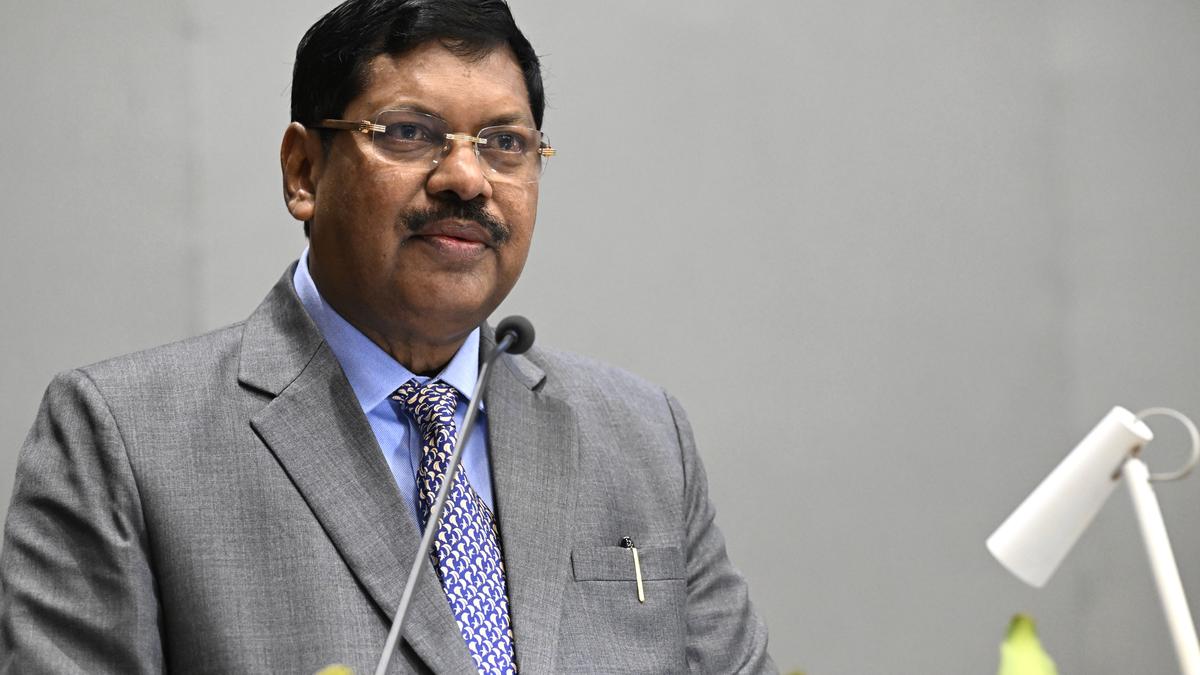Justice Bhushan Ramakrishna Gavai.
| Photo Credit: G. Ramakrishna
The Supreme Court said it was not “powerless” if a Speaker chose to remain “indecisive” on petitions seeking the disqualification of legislators who defect.
A Bench headed by Justice B.R. Gavai on Wednesday said a Speaker could not use his indecision to defeat the worthy objective of the Tenth Schedule (anti-defection law) of the Constitution.
Also read | BRS MLAs disqualification row: Rights of political party can’t be frustrated, says SC
The courts cannot certainly tell a Speaker to decide in a particular manner, but can it not tell a Speaker to decide within a specified and reasonable period, Justice Gavai asked.
The Bench headed by Justice Gavai is hearing petitions filed by Bharat Rashtra Samithi (BRS) leaders, including K.T. Rama Rao and Padi Kaushik Reddy, seeking timely action by the Telangana Assembly Speaker on disqualification proceedings pending against 10 MLAs who shifted allegiance to the ruling Congress party in the State.
The main question in the case is whether constitutional courts cannot direct Speakers, who act as quasi-judicial tribunals under the anti-defection law, to decide disqualification petitions filed with them under the Tenth Schedule of the Constitution within a specified period.

“Your argument is that if a Speaker does not act, courts, which not only have the power but also the duty as guardian of the Constitution, would be powerless? So, out of the five-year term of the House, if defection happened in the first year and Speaker does not do anything for the next four years, courts cannot do anything but sit with their hands tied?” Justice Gavai asked senior advocate Mukul Rohatgi and advocate Sravan Kumar, who appeared for the respondents.
The respondent side, also represented by senior advocate A.M. Singhvi, include the Telangana government, State Assembly Speaker, Secretary of the Assembly, and the Election Commission of India, among others.
Mr. Rohatgi argued extensively that Constitutional courts could request a Speaker, from one Constitutional body to another, to decide disqualification petitions expeditiously, but not bind the Speaker to a deadline of four or six weeks.
The senior advocate said courts have no power of Superintendent over a Speaker. Even though the Speaker functioned as a tribunal under the anti-defection law, the court’s power of judicial review was limited to the final decision of the Speaker on disqualification pleas, and did not extend to putting him on the clock.
Also read | BRS welcomes Telangana High Court direction on MLAs disqualification petition
But Justice Gavai said that although the message from the court to the Speaker to not delay was worded as a ‘request’, it was not really one.
“If the Supreme Court’s ‘request’ is followed in breach by the Speaker, the court can invoke its extraordinary powers under Article 142 of the Constitution… Be it any Constitutional functionary, if the request or direction of the Supreme Court is not abided, we are not powerless,” Justice Gavai responded to Mr. Rohatgi’s submissions.
Mr. Rohatgi asked whether “somebody can tell the court to do this or that”.
“How can a Constitutional authority be directed to decide disqualification petitions in six or eight weeks? Instead, the court can say the Speaker may decide within a reasonable period,” Mr. Rohatgi asked.
Justice Gavai said disqualification petitions were filed before the Telangana Assembly Speaker in March-April 2024. The notice was issued only in January this year.

“Do you call this a ‘reasonable period’?” Justice Gavai asked the senior lawyer.
The Supreme Court had intervened in the past in egging on Speakers to decide long-pending petitions filed before them under the Tenth Schedule.
Senior advocate C.A. Sundaram, for the petitioners, had earlier argued that political partisanship still guided Speakers though their office required them to be impartial.
“When the law and the Rules are silent about the time [to decide petitions under the anti-defection law], does it give Speakers, acting as quasi-judicial tribunals, an absolute largesse to take whatever time he wants or would the Constitutional court have the power to ensure that the petitions are decided within a time which is in tune and in the spirit of the Tenth Schedule of the Constitution,” Mr. Sundaram had framed the question in the case.
He had argued that since Speakers function as a tribunal, the courts would definitely have the power of judicial review over their actions.
Published – April 02, 2025 07:43 pm IST
